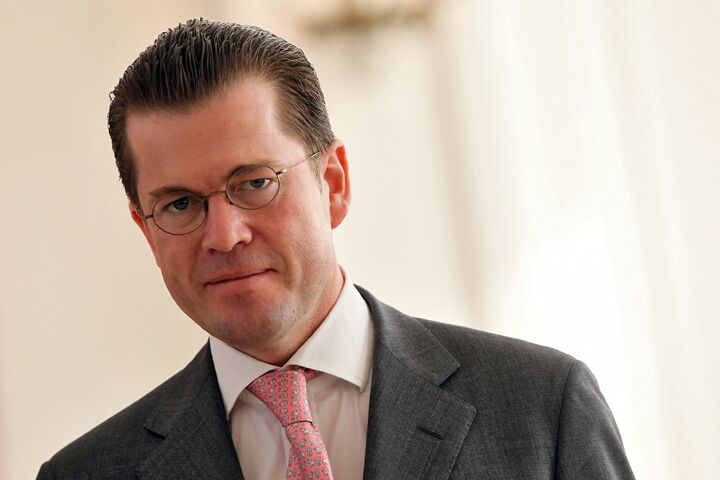
Guttenberg—Mixed Signals
Ever mindful of the selling value of celebrity, the editors of certain German media outlets are keeping the name of their nation’s top celeb in the headlines. News of the highly popular ex-minister of defense, Karl-Theodor zu Guttenberg, still sells well in Germany, so it is in the interests of a certain segment of the German press to periodically promote the latest rumor about the bright young baron and his attractive wife.
Late last month accounts of Guttenberg’s recent attendance at his Christian Social Union (csu) party conference created rumors that he may be elected as party chief by autumn. Then, recently, Spiegel spread the rumor that the Guttenbergs may relocate to either London or Washington by the start of the next academic year.
When one truly understands the German mind, one comprehends that it delights in mystery. The German philosopher Nietzsche, revered by the populace on college campuses a few decades ago, spoke of the “hidden passages” in the German mind, of its tendency for intrigue and the more secretive, even dark, aspects of life. German fairy tales often center on such phenomena.
Thus it is, when following a news item in Germany, one can sometimes read contrary views that are at opposite poles on any particular issue on which the German media may be commenting.
A few years ago this was the case when reading accounts of Germany’s economy. One pundit had it up while another had it down, both at the same time.
Propaganda was ever a modern German phenomena. Perhaps it carries over to certain Teutonic press barons. After all, they are not too old to forget that it was Hitler’s henchman, Joseph Goebbels, who controlled Germany’s mass media 70 years ago, his basic philosophy being: “If you tell a lie big enough and keep repeating it, people will eventually come to believe it. The lie can be maintained only for such time as the state can shield the people from the political, economic and/or military consequences of the lie. It thus becomes vitally important for the state to use all of its powers to repress dissent, for the truth is the mortal enemy of the lie, and thus by extension, the truth is the greatest enemy of the state.”
So when we read of a breaking story in Germany, I tend to be very cautious of reading too much into it till the facts are proven. That is certainly the case with the current rumors on the Guttenbergs taking a sabbatical abroad. Maybe it’s true, maybe it’s not.
So what are the facts surrounding the current status and intentions of Karl-Theodor zu Guttenberg?
This is what we know to date:
There appears to be little doubt, despite disclaimers by the protagonists, that the searching out of Guttenberg’s doctoral thesis to prove plagiarism was politically motivated. Those responsible have yet to meet the challenge to make a case of plagiarism against a left-wing politician or academic. Their current tally is three politically conservative “scalps,” as the leftist Spiegel put it—Guttenberg, Veronica Sass, the daughter of conservative ex-Bavarian state governor Edmund Stoiber, and high-profile center-right Free Democratic Party member and member of the European Parliament, Silvana Koch-Mehrin.
The efforts to prove plagiarism have been centered on high-profile center-right politicians, of that there is no doubt, with Veronica Sass and Silvana Koch-Mehrin being singled out to doubtless give the impression that the targeting of Guttenberg was not just going to be an isolated incident. But to those who know German politics, and the way the left wing operates in Germany, this scenario is hardly opaque. We have no political barrow to push at all. But we are realists, and you can see right through this for what it is—a cheap political stunt geared to cut the rug out from under the enemy of the Greenies and other leftists, Karl-Theodor zu Guttenberg.
The second fact is that Guttenberg was given a rousing welcome by his party, the csu, during its May congress, and touted by some commentators as a prospect for the party leadership at its autumn congress.
The third glaring fact is that Guttenberg’s popularity in Germany remains extremely high. The latest polls indicate only minor slippage of a few percentage points compared to his peak of popularity while in political office.
Other than these three main facts, little is really known of the Guttenberg family’s plans for the immediate future.
One of our sources has indicated that Guttenberg’s personal assistant may be about to pursue a doctorate at a British university. Perhaps there’s less risk of being attacked by Germany’s leftist political plagiarism hunters by doing so. Whether this gives a hint that Guttenberg himself will be going to London is a moot point. One would think if he was taking a break overseas that Washington, where he has well-entrenched contacts, would be the better option.
Either way, it’s all speculation at this point, with one exception.
As we have previously indicated, Karl-Theodor zu Guttenberg, baron of the Holy Roman Empire, whether he remains in Germany, or travels abroad, is in the box seat for a return to politics in Germany when the moment strikes. By resigning from all political offices, Guttenberg has placed himself in the ideal position to be invited back to office, rather than having to gain office through the electoral process. And that is a situation for which we have been watching to occur at the top in German and European politics since the Berlin Wall came down and Germany reunited to fulfill its prophesied destiny.
